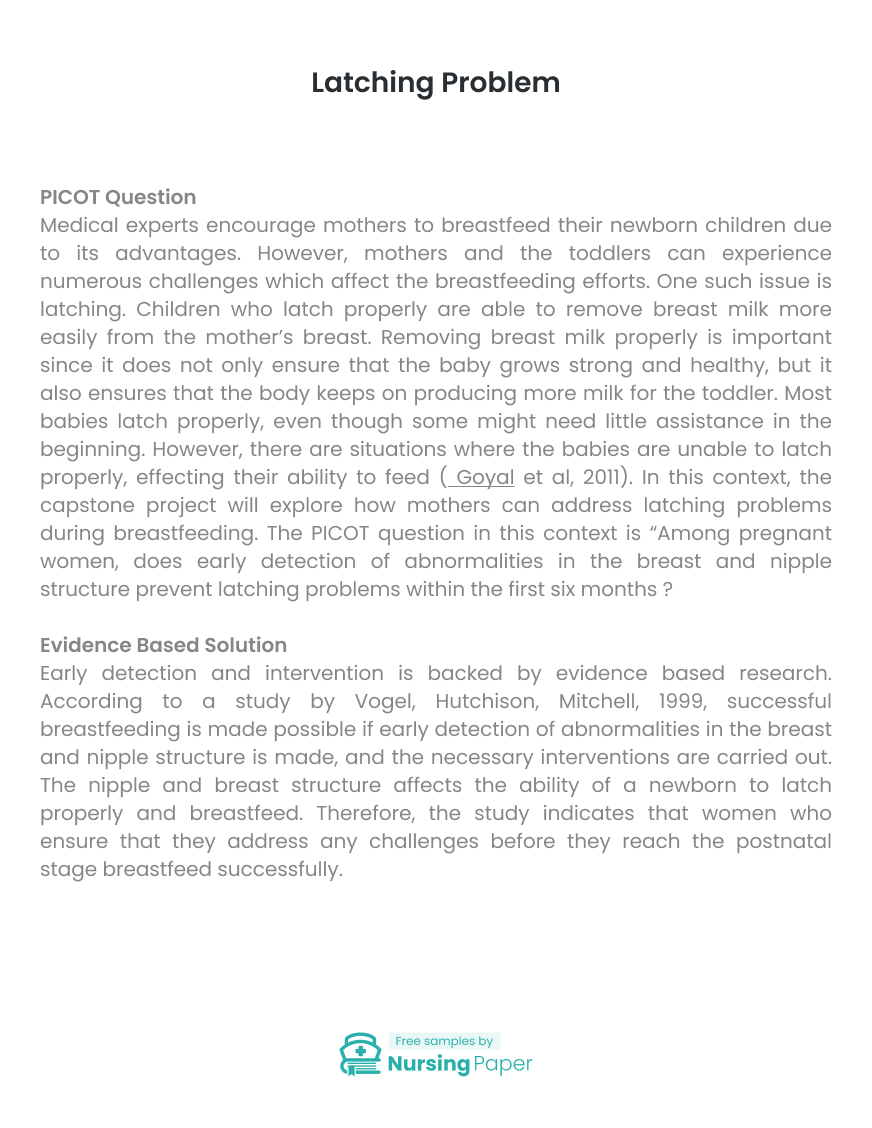
Latching Problem
PICOT Question
Medical experts encourage mothers to breastfeed their newborn children due to its advantages. However, mothers and the toddlers can experience numerous challenges which affect the breastfeeding efforts. One such issue is latching. Children who latch properly are able to remove breast milk more easily from the mother’s breast. Removing breast milk properly is important since it does not only ensure that the baby grows strong and healthy, but it also ensures that the body keeps on producing more milk for the toddler. Most babies latch properly, even though some might need little assistance in the beginning. However, there are situations where the babies are unable to latch properly, effecting their ability to feed (Goyal et al, 2011). In this context, the capstone project will explore how mothers can address latching problems during breastfeeding. The PICOT question in this context is “Among pregnant women, does early detection of abnormalities in the breast and nipple structure prevent latching problems within the first six months?
Evidence-Based Solution
Early detection and intervention is backed by evidence based research. According to a study by Vogel, Hutchison, Mitchell, 1999, successful breastfeeding is made possible if early detection of abnormalities in the breast and nipple structure is made, and the necessary interventions are carried out. The nipple and breast structure affects the ability of a newborn to latch properly and breastfeed. Therefore, the study indicates that women who ensure that they address any challenges before they reach the postnatal stage breastfeed successfully.


Nursing Intervention
The nurses would be encouraged to educate pregnant women on the importance of early examination for defects ion their nipples and breasts. The effect of latching problems on children and the mothers would also be shared in the nursing intervention.
Patient Care
The patient should be provided with adequate care before and after the collective procedure to enable the mother to heal and also complete the pregnancy period successfully.
Health Care Agency
The support required by the population would be provided by maternity clinics in order to prepare the pregnant women for motherhood.

Nursing Practice
The nursing practice involves providing education and information about latching problems for the pregnant women.
PICOT Question
Among pregnant women (P), does early detection of abnormalities in the breast and nipple structure (I) prevent latching problems within the first six months (T)?
Population: the population targeted in this case is pregnant women



Intervention: Assessing the nipple and breast structure for early detection of abnormalities that may impede successful breastfeeding
Comparison: Early assessment of nipple and breast structure versus no assessment during pregnancy.
Outcome: early detection and treatment versus no treatment
Time: The participants would be observed after they give birth for a period of six months.
Method
A detailed literature search was carried out to identify credible studies on the topic. Some of the databases used included Pubmed, Medscapes, and CINAHL. Despite yielding 23 potential journals and articles, only 4 were chosen for the research. The criteria of the journals were that used was that they had to be peer reviewed journals.
Discussion
The research results were consistent. It was clear that when women were able to detect challenges which affected breastfeeding earlier, then corrective measures would be implemented before it is too late (Neifert, 2004). Education is also crucial and nurses are encouraged to give pregnant women information on latching challenges and the stapes taken to correct it (Nagin, 2017).
Conclusion
Since women are encouraged to breastfeed their children during infancy, mothers and their children had to endure challenges such as latching to ensure that breastfeeding is controlled. If parents and newborns are to enjoy better health outcomes, they should address abnormities before they begin breastfeeding to prevent latching problems.
1. Goyal, R C, Banginwar, A, S., Ziyo, F, & Toweir, A. (2011). Breastfeeding practices: Positioning, attachment (latch-on) and effective suckling – A hospital-based study in Libya. J Family Community Med. Vol 18(2): pp74–79.doi: 10.4103/2230-8229.83372
2. Nagin, K, M. (2017). “Breastfeeding and Abnormalities of the Breast: Breast Pathology and Problems Nursing Women May Face.” VeryWell Family. Reviewed by Meredith Shur, MD
3. Neifert MR. (2004). Breastmilk transfer: Positioning, latch-on, and screening for problems in milk transfer. Clin Obstet Gynecol. Vol 47:pp656–75.
4. Vogel, A, Hutchison BL, Mitchell EA. (1999).Factors associated with the duration of breastfeeding. Acta Paediatr. Vol 88(12):pp1320-6.



The download will start shortly.

The download will start shortly.
 Subject:
Health and Social Care
Subject:
Health and Social Care  Number of pages: 2
Number of pages: 2  Subject:
Medicine
Subject:
Medicine  Number of pages: 9
Number of pages: 9  Subject:
Health and Social Care
Subject:
Health and Social Care  Number of pages: 2
Number of pages: 2  Subject:
Health and Social Care
Subject:
Health and Social Care  Number of pages: 2
Number of pages: 2  Subject:
Health and Social Care
Subject:
Health and Social Care  Number of pages: 7
Number of pages: 7  Subject:
Medicine
Subject:
Medicine  Number of pages: 3
Number of pages: 3  Subject:
Health and Social Care
Subject:
Health and Social Care  Number of pages: 19
Number of pages: 19  Subject:
Health and Social Care
Subject:
Health and Social Care  Number of pages: 299
Number of pages: 299  Subject:
Health and Social Care
Subject:
Health and Social Care  Number of pages: 3
Number of pages: 3  Subject:
Medicine
Subject:
Medicine  Number of pages: 4
Number of pages: 4  Subject:
Nursing
Subject:
Nursing  Number of pages: 3
Number of pages: 3  Subject:
Health and Social Care
Subject:
Health and Social Care  Number of pages: 2
Number of pages: 2  Subject:
Health and Social Care
Subject:
Health and Social Care  Number of pages: 5
Number of pages: 5  Subject:
Health and Social Care
Subject:
Health and Social Care  Number of pages: 10
Number of pages: 10  Subject:
Nursing
Subject:
Nursing  Number of pages: 5
Number of pages: 5 
